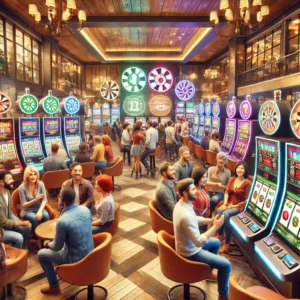The Allure of Risk and Reward
Gambling is a behaviour and psychology thing, like any other gambling risk returnitories. The anticipation of hitting on big payday hit the reward center in their brain, which releases dopamine (this is a neurotransmitter associated with pleasure and motivation). When this biochemical response happens, you feel a little zest of anticipation quiver across your peripheral sensors (nerve endings) and that can be very addictive.
Intermittent reinforcement is a major factor in gambling addiction Gambling probabilities are nowhere near as predictable as rewards and come in random timing, which makes the behavior psychologically more rewarding. When the gambler wins, this dopamine release reinforces continued behavior despite receiving a financial loss for every wager. This vicious circle of reward anticipation and compensation may well lead to addiction.
Cognitive Biases in Gambling
Gambling behavior is strongly influenced by cognitive biases. For example, the belief that past random events can influence future ones is an incorrect reasoning bias known as gambler’s fallacy. For instance, a gambler might say that the slot machine is “hot” after losing some rounds. This illusion is what keeps people gambling though they continue to stand just a 1/37 chance per bet of winning.
People in general tend to have a cognitive bias towards the illusion of control, or that they can influence games with their skill and strategy. This type of bias plays a very big role in deterministic mixtures, such as the games with dice or cards where results are random. The overconfidence created by an illusion of control can lead us taking on more risk than we actually realise.
Another cognitive phenomenon that affects people is called the near-miss effect. Near-misses, short of coming within one symbol in the vent-hole, when a gambler misses. The near-misses provide little more than encouragement for the gambling activity, and may thus be even worse in promoting continued play.
Emotional Factors in Gambling
One of the dominant factors behind gambling behavior is that it makes a person emotional. For many, its an escape from reality and a way for them to cope with stressors like work pressure, anxiety or depression cause of frustration or even boredom. Gambling offers short-term excitement and distraction from negative emotions.
Nevertheless, this emotional dependency on gambling can get a fatal in a cycle of addiction. Once player loses a bit they may feel guilt/shame/hopeless to try and get ahead again which can lead them into until more addictive gambling cycle. Problem gambling often results in significant financial and personal difficult as a result of this phenomenon, referred to as the chasing losses.
Gambling is also social (a behavior) Casinos and betting sites by signing up open easily play over have promotion creates an engaging, social atmosphere. Gambling with other people around, the sounds of slots and a slightly celebratory atmosphere can make gambling more enjoyable overall which is likely to encourage players to play for longer.
Personality Traits and Their Influence
High risk gambling problems are associated with certain personality traits One example is impulsivity, which refers to a propensity towards acting without thinking through potential consequences. Impulsive people are more likely to take risks, such as gambling and inability to control their impulses.
Another personality trait that is associated with gambling behavior is sensation-seeking. People who are sensation-seekers tend to have a need for new and exciting experiences. Gambling is inherently high-stimulating and as such, gambling should therefore be particularly appealing to sensation-seekers who are motivated by their desire for excitement.
At the same time, people who have a strong need for achievement may be more likely to gamble. They view gambling as a skill contest that can be beaten if they put in enough effort, even on games of pure chance. This can be a motivating factor in continued gambling behavior, despite previous losses.
Symptoms of Gambling Addiction
Pathological gambling, or in other words a gambling addiction is a dangerous mental illness with this circumstance that you can not control your gaming behavior and are associated with it even for him significant personal losses. It is a dark affliction that affects not only the person afflicted by it but their families, relationships and mental well-being as financial ruin paves its way.
For the purposes of this fact sheet, we will use the term gambling wellness and differentiate it from a more specific diagnosis: Gambling Disorder (or pathological or compulsive gambling) which appears in The Diagnostic and Statistical Manual of Mental Disorders (DSM-5), with Substance Use Disorders. A gambling addiction is when an individual has a preoccupation with either online or offline casino games, repeats unsuccessful failed attempts to control his (or her) gaming and acts on such behavior despite bad consequences.
Therapies for gambling addictions almost always involve support groups, psychotherapy and sometimes in severe cases where clinically indicated-medications. CBT (cognitive-behavioral therapy): CBT is especially successful in treating gambling addiction as it helps individuals recognize and alter unhealthy thought process, so they will cease to gamble. Community support groups like Gamblers Anonymous can provide the added benefit of connecting with people who know exactly what you are going through and offer motivation to help you overcome your addiction.
Harm Prevention and Minimisation for Gambling Problems
Understanding the underlying mechanisms of gambling at psychological level might be useful for developing more effective preventive interventions. Responsible gambling behaviors can be taught to the public through:Spin-off awareness campaignsEducational programs or efforts that give information outlining for example, what problem gaming / pathological gambling is and how this particular issue CAN affect people. Initiatives are designed to mitigate the stigma of gambling problems and motivate people who spot signs early on, I would suggest you…
Legislation is likewise crucial in combating gambling addiction. Mandatory self-exclusion programs, enforced expenditure limits and regular monitoring of gambling experience are some initiatives that governments and gambling operators can implement instead. This makes the less fortunate ones to stay out and prevent them from getting addicted.
In summary, the psychology of gambling consists of multiple cognitive, emotional and social components. It is vital to recognize these dynamics in the consideration of preventive strategies and treatment options against gambling addiction. By understanding the psychological processes involved, and encouraging responsible gaming behaviours – we can reduce some of these negative outcomes from gambling, helping people to have better lives.


